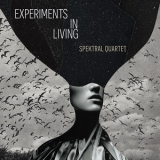 Experiments in Living; Johannes Brahms: Streichquartett op. 51/1; Arnold Schoenberg: Streichquartett Nr. 3 op. 30; Ruth Crawford Seeger: String Quartet 1931; Sam Pluta: binary/momentary logics: flow state/joy state; Anthony Cheung: The Real Book of Fake Tunes; Charmaine Lee: Spinals; George Lewis String Quartet 1.5: Experiments in Living; Caire Chase, Flöte, Charmaine Lee, Vocals & Elektronik, Spektral Quartet; 2 CDs New Focus Recordings FCR270; Aufnahme 2017/2018, Veröffentlichung 28/08/2020 (125'30) - Rezension von Remy Franck
Experiments in Living; Johannes Brahms: Streichquartett op. 51/1; Arnold Schoenberg: Streichquartett Nr. 3 op. 30; Ruth Crawford Seeger: String Quartet 1931; Sam Pluta: binary/momentary logics: flow state/joy state; Anthony Cheung: The Real Book of Fake Tunes; Charmaine Lee: Spinals; George Lewis String Quartet 1.5: Experiments in Living; Caire Chase, Flöte, Charmaine Lee, Vocals & Elektronik, Spektral Quartet; 2 CDs New Focus Recordings FCR270; Aufnahme 2017/2018, Veröffentlichung 28/08/2020 (125'30) - Rezension von Remy Franck

Mit dem Doppelalbum Experiments in Living feiert das Spektral Quartet aus Chicago seinen 10. Geburtstag. Das Konzept, so sagen die Musiker, würdige den Kerngedanken ihrer Philosophie, nämlich, dass unterschiedliche Musikstile über Jahrhunderte hinweg « auf unerwartete und fesselnde Weise miteinander sprechen und dass das Unbekannte im richtigen Kontext schnell vertraut werden kann ». Das Beste sei es daher, die aufgenommenen Werke in immer wieder anderer Reihenfolge zu hören.
Das Streichquartett op. 51/1 von Johannes Brahms eröffnet das Programm. Das Spektral Quartet gibt davon eine eloquente Interpretation mit drängenden Ecksätzen, viel Klangfülle und einer bemerkenswerten Transparenz im dichten musikalischen Gewebe dieses Quartetts. Das betont nostalgisch und warmherzig gespielte Andante führt zum kontrastreichen Allegretto.
Es folgt dann eine leidenschaftliche und dynamische Darbietung des 3. Streichquartetts von Arnold Schönberg. Wieder einmal bewundern wir die Transparenz des Spiels, die in der sehr direkten Tonaufnahme besonders wirkungsvoll wird.
Das Streichquartett der amerikanischen Komponistin Ruth Crawford-Seeger (1901-1953) zeigt die Modernität ihres eher an der Neuen Wiener Schule als am Neoklassizismus orientierten Kompositionsstils. Das 11-minütige Quartett erweist sich als eine Komposition von größter Ausdrucksstärke: die Dissonanzen verweben sich hier zu einer intensiven Ausdrucksweise des Tragischen.
Mit Sam Plutas (*1979) ‘binary/momentary logics: flow state/joy state’ betreten wir dann zeitgenössischen Boden mit einer hektischen Musik, deren Ruhephasen dazu dienen, die Batterien aufzuladen.
Der Komponist Anthony Cheung schlägt eine Genre-Brücke mit seinem Real Book of Fake Tunes, in dem ein Hauch von Jazzharmonien in die Parts der Flötistin Claire Chase und des Quartetts einfließen. Es ist ein durchaus originelles Werk, das viele Stimmungen evoziert.
Spinals schließlich ist eine vollständig improvisierte Musik mit elektronischen Inserts, produziert in Zusammenarbeit mit der Sängerin Charmaine Lee. Gewöhnungsbedürftig!
Das spannende, gut eine Viertelstunde lange String Quartet No. 1.5 von George Lewis beendet diese weitgestreckte musikalische Reise, in der sich das Spektral Quartet in allen Stilen zuhause fühlt und spieltechnisch mit einer immensen Klarheit beeindruckt.
The Spektral Quartet from Chicago celebrates its 10th birthday with the double album Experiments in Living. The concept, the musicians say, pays tribute to the core idea of their philosophy, namely that different styles of music over the centuries « speak to each other in unexpected and captivating ways and that the unknown can quickly become familiar in the right context ». The best thing to do, therefore, is to listen to the recorded works in a constantly changing order.
The String Quartet op. 51/1 by Johannes Brahms opens the program. The Spektral Quartet gives an eloquent interpretation of it, with urgent corner movements, a lot of sonority and a remarkable transparency in the dense musical texture of this quartet. The Andante, played with an emphasis on nostalgia and warmth, leads to the contrasting Allegretto.
This is followed by a passionate and dynamic performance of the Third String Quartet by Arnold Schönberg. Once again we admire the transparency of the playing, which becomes particularly effective in the very direct sound recording.
The String Quartet by the American composer Ruth Crawford-Seeger (1901-1953) shows the modernity of her compositional style, which is more oriented towards the New Viennese School than towards neo-classicism. The 11-minute quartet proves to be a composition of the greatest expressiveness: the dissonances interweave here into an intense expression of the tragic.
With Sam Pluta’s (*1979) ‘binary/momentary logics: flow state/joy state’ we then enter contemporary ground with a hectic music whose resting phases serve to recharge the batteries.
Composer Anthony Cheung bridges a genre gap with his Real Book of Fake Tunes, in which a hint of jazz harmonies is added to the parts of flautist Claire Chase and of the quartet. It is a thoroughly original work that evokes many moods.
Spinals finally is a completely improvised music with electronic inserts, produced in collaboration with the singer Charmaine Lee. It takes getting used to!
The exciting String Quartet No. 1.5 by George Lewis, a good quarter of an hour long, concludes this far-reaching musical journey, in which the Spektral Quartet feels at home in all styles and impresses with its immense clarity of playing technique.
























